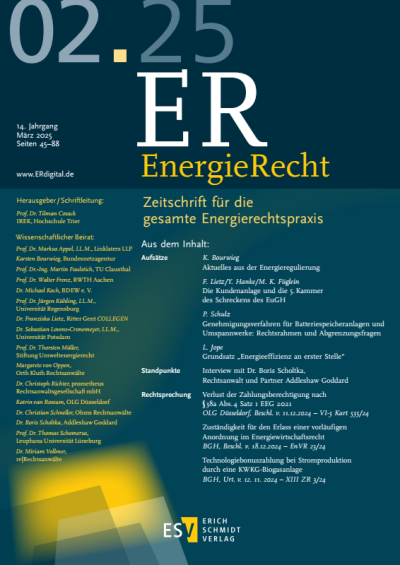
Publications
Publications of our lawyers
Energy law is an interdisciplinary subject that has intersections with general commercial law, company law, administrative law, construction law, public procurement law and energy tax law, among others.
-
![ewerk0325 Cover of magazine EWERK 03 / 2025]()
‘Contract term and termination exclusion clauses in the usage agreement for the construction and operation of wind turbines’ by Oberpichler & Semper
Federal Court of Justice, judgment of 12 March 2025, ref. XII ZR 76/24: Contract term and termination exclusion clauses in the usage agreement for the construction and operation of wind turbines
Autor:
EWeRK 2025, Issue 3, p. 112 ff.
-
![ewerk0325 Cover of magazine EWERK 03 / 2025]()
‘Battery storage as a generation plant within the meaning of Section 18 (1) sentence 1 StromNEV – Payment of avoided grid fees for decentralised feed-in from electricity storage facilities’ by Brahms & Behr
Federal Court of Justice, ruling of 26 November 2024, ref. EnVR 17/22: Battery storage as a generation plant within the meaning of Section 18(1) sentence 1 StromNEV – payment of avoided grid fees for decentralised feed-in from electricity storage facilities
Autor:
EWeRK 2025, Issue 3, p. 102 ff.
-
![getimage]()
‘Battery storage and “service” within the meaning of Section 35(1)(3) of the German Building Code (BauGB) – The fairy tale of grid serviceability’ by Schulz
Autor:
Journal for German and International Construction and Public Procurement Law (ZfBR), 2025, pp. 429–433
-
![pM_EUPHORIE_Cover_1000x1350 Cover polis EUPHORIE 02/2025]()
‘Euphoria as a driver of the urban energy transition’ by Oberpichler
Legal contribution // How green cities can become economic success stories.
Autor:
polis EUPHORIE 02/2025, p. 42
-
![zer_2025_03_b0001_jope-nebel_v02_Seite_1]()
‘Addressees of the Energy Efficiency Act’ by Nebel & Jope (external)
The Energy Efficiency Act (EnEfG) contains a large number of obligations for companies, but does not itself define what is meant by a company; there is no legal definition of this key term in the Act. It is therefore unclear which companies are actually addressed and obligated by the Energy Efficiency Act. The following article concretises the term ‘company’ in the Energy Efficiency Act by means of the terminology in the Energy Services Act (EDL-G), on the basis of EU law and in contrast to the complementary term ‘public body’.
Autor:
ER Energierecht May 2025, p. 110 - 113
-
![zer_2025_03_b0003_brahms_v02_Seite_1]()
‘Flexible grid connection agreements in the EEG and the EnWG’ by Brahms and Schulze
As part of the grid connection of electricity generation or storage systems, such as systems for the
generation or storage of electricity from renewable energies within the meaning of Section 3 No. 1 EEG
2023 (RE plants) and electricity storage systems, there are currently bottlenecks in grid connections.
In particular, the expansion of renewable energy plants is proceeding faster than the necessary grid expansion
so that there are considerable waiting times for obtaining a grid connection
and the available grid connection points are regularly further away from the plant location.
from the plant location. In order to meet this challenge and speed up the grid connection, there is a need for
legal changes are needed, among other things, to increase flexibility. In the EnWG and
new regulations on the agreement of flexible grid connection agreements between grid operators and plant
between grid operators and system operators, which, among other things, allow the connection of
several systems to a grid connection point with a capacity that exceeds the connection capacity.
capacity. The addition to Section 17 (2b) EnWG and Section 8a EEG 2023 was made
in implementation of Art. 6a of the amended Internal Electricity Market Directive.Autor:
ER Energierecht Mai 2025, p. 97 - 103
-
![pM_TIEFE_Cover_1000x1350]()
‘Deep Dive on OOP for the sustainable development of energy projects’ by Brahms
The challenges facing local authorities are manifold. They range from strained public budgets and demographic trends to an increasingly ageing population, the call to adapt urban development to climate change, as well as how to deal with increasing migration and the slow progress of digitalisation. These effects are directly visible to citizens in very different forms, such as dilapidated roads, bridges or rail networks. It remains to be seen whether this situation will develop sustainably and positively for local authorities due to the debt policy that is now in place. However, public-private partnerships (PPPs for short), which can accelerate processes and structures, are a good way of increasing local authorities’ long-term ability to act.
Autor:
polis 01/2025, p. 44 ff.
-
![f95fddb7-c12a-442c-919e-8048cdec429a]()
‘KWKG amendment 2025 – transitional solution through new funding periods’ by Meltendorf & Schulze
Essay on the topic: KWKG amendment 2025 – transitional solution through new funding periods
Autor:
EWeRK issue 6/2024, p. 199 ff.
-
![zerd.2025.02]()
‘Authorisation procedure for battery storage systems and substations: legal framework and demarcation issues’ by Schulz
The importance of battery energy storage systems (BESS) for the energy transition is growing – but their approval process raises many questions. 🏗️⚡
When might a planning permission not be required? Does the Federal Immission Control Act (𝗕𝗜𝗺𝗦𝗰𝗵𝗚) apply? Is an environmental impact assessment (𝗨𝗩𝗣) to be carried out? And how is the specialised planning of energy industry law (𝗘𝗻𝗪𝗚) to be taken into account – especially if a transformer station and high-voltage lines are planned in addition to the BESS?Autor:
ER EnergieRecht March 2025, p. 62 - 67
-
![VW_02_2025_Nebel_Seite_1]()
‘The ECJ judgement on the grid regulatory classification of customer installations’ by Nebel
The future scope for the implementation of decentralised
decentralised supply and neighbourhood conceptsAt first glance, the ECJ ruled in its judgement of 28 November 2024 – Case C-293/23 that the definition of customer premises in Section 3 No. 24a of the German Energy Industry Act (EnWG) is not in line with EU law. It is clear that the ruling is fundamental for the implementation of decentralised supply and neighbourhood concepts and that German regulatory law now needs to rethink how it deals with unregulated small grids.
Autor:
Issue 02/2025 of the utility industry, p. 33 - 37








